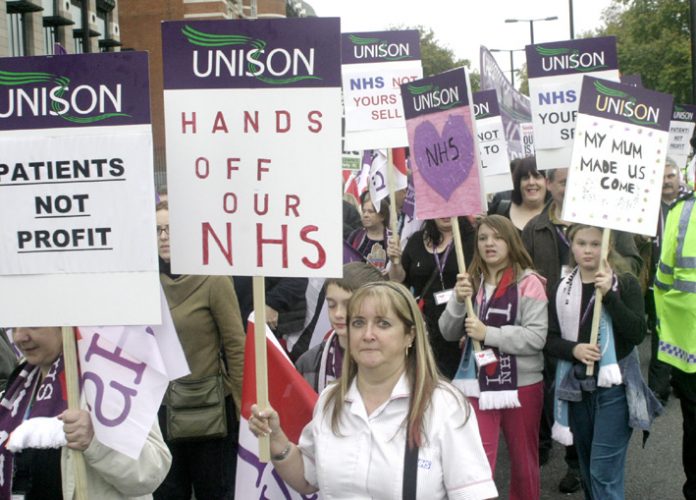
Prime Minister Brown is ‘on a collision course with the trade unions’, warned UNISON yesterday.
A UNISON spokeswoman told News Line: ‘We want to make it clear that we’re not going to accept a two per cent pay limit this year, next year or the year after.
‘We will be doing all we can to make the government change its course.’
She was responding to remarks made by Brown at his monthly press conference at Downing Street, a day after trade union leaders had launched a ‘fightback’ campaign against the government’s two per cent public sector pay freeze.
Answering questions about Northern Rock, Brown told journalists: ‘We will continue to have low inflation to keep interest rates down.’
Blaming workers for inflation, he added: ‘The unpopular measures on public sector pay have been necessary.’
Later, he said: ‘I would like to pay the police now.’ But, he added: ‘We will continue to take tough, long-term decisions.’
A TUC spokesman told News Line: ‘We reiterate what we were saying yesterday, that the government is on a collision course with six million public servants.
‘There is a lot of anger in the unions about the pay cuts.
‘We’ll continue to campaign to end this policy.’
At the Downing Street press conference, both Brown and chancellor Darling insisted that ‘the economy is fundamentally sound’.
But neither would give a 100 per cent guarantee that taxpayers will get all their money back from Northern Rock.
Darling said: ‘We had to intervene because there was a systemic risk to the banking system.’
Brown added later: ‘We have taken the action that is necessary. The test is whether we can stand the global financial storms.’
When Brown was asked if he had ignored warnings from the Governor of the Bank of England over Northern Rock, Darling intervened sharply to say: ‘That’s not true.’
Darling added: ‘We were faced with unprecedented pressures in recent years. We made an intervention and we have to see it through.’
Asked about the possible nationalisation of Northern Rock, Brown and Darling both said they, ‘do not rule out any options.’
Brown said that he had to do, ‘the best for Northern Rock’, whose aid package from public funds is now estimated at £57bn.
In answer to other questions, Brown said he wants to end the prime minister’s final say over who gets awarded peerages, and that the final decision should instead be taken by an independent appointments commission, with nominees tested on ‘probity and the national interest’.
He said this would ‘go some way to answering questions that have been raised in recent years’.
During questions on foreign policy, Brown was asked about the deterioration of security in southern Iraq, since the British pulled back to Basra air station.
It was put to Brown that ‘women have been beheaded’ and that ‘you have handed over to militias and religious extremists’.
Brown replied: ‘I don’t accept the picture you are painting.’
Another journalist asked when Britain would withdraw its troops from Iraq.
Brown said: ‘I’m not looking to any artificial timetable. We plan to reduce troop numbers from 4,500 to 2,500 and will review the position in the Spring.’
He was asked by an Israeli journalist, ‘what guarantees did you get from the Palestinians’, over ending the firing of rockets into Israel?
Brown said: ‘I raised with President Abbas the issue of security for the Israeli people.’
Brown condemned the Palestinian rocket attacks, adding that he is, ‘hopeful goodwill will now return again for security for Israel and a viable Palestinian state.’
Asked what he expected from the UN Security Council meeting on Kosovo, Brown said, ‘Credit has to be given to both sides’ restraint, which has kept the region still at peace.’
He doubted the Security Council meeting, ‘will make progress’ but hoped, ‘the Serbians and representatives of Kosovo reach an agreement over the next few weeks.’